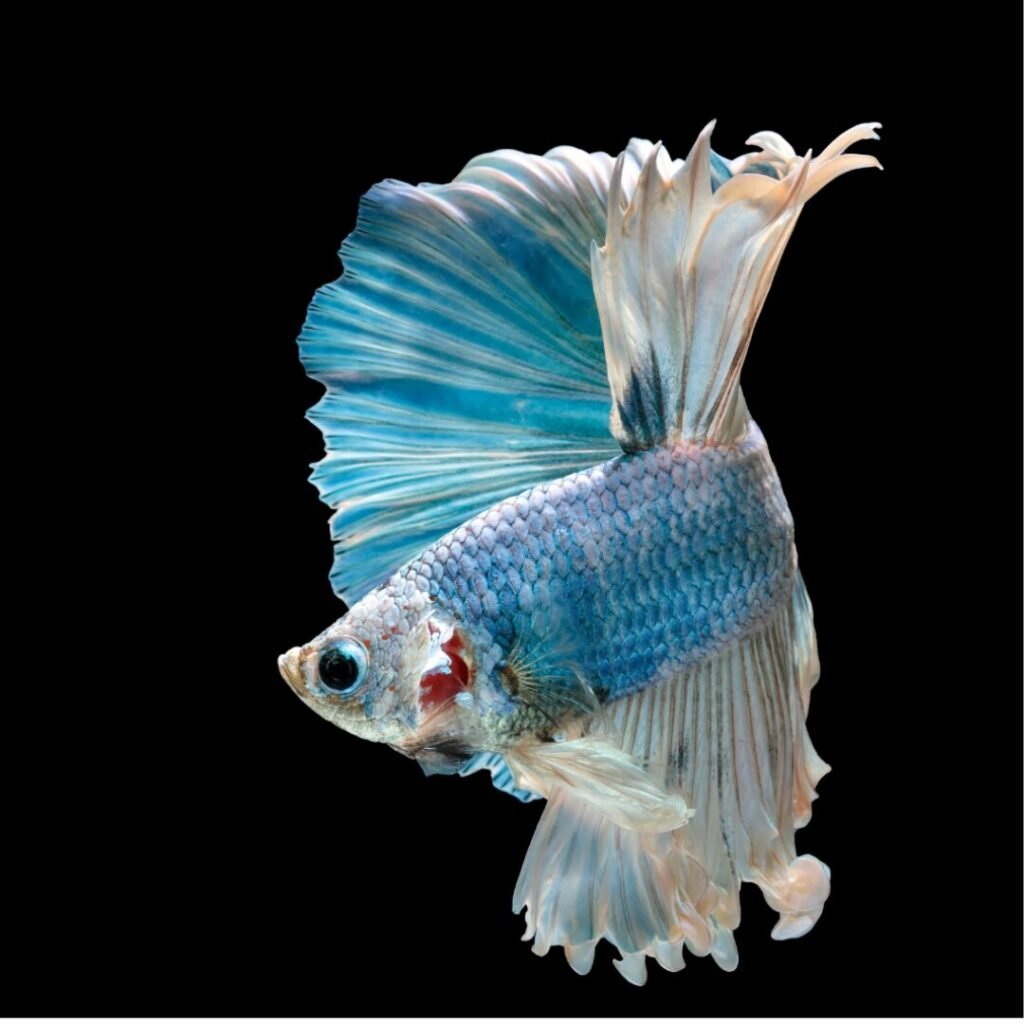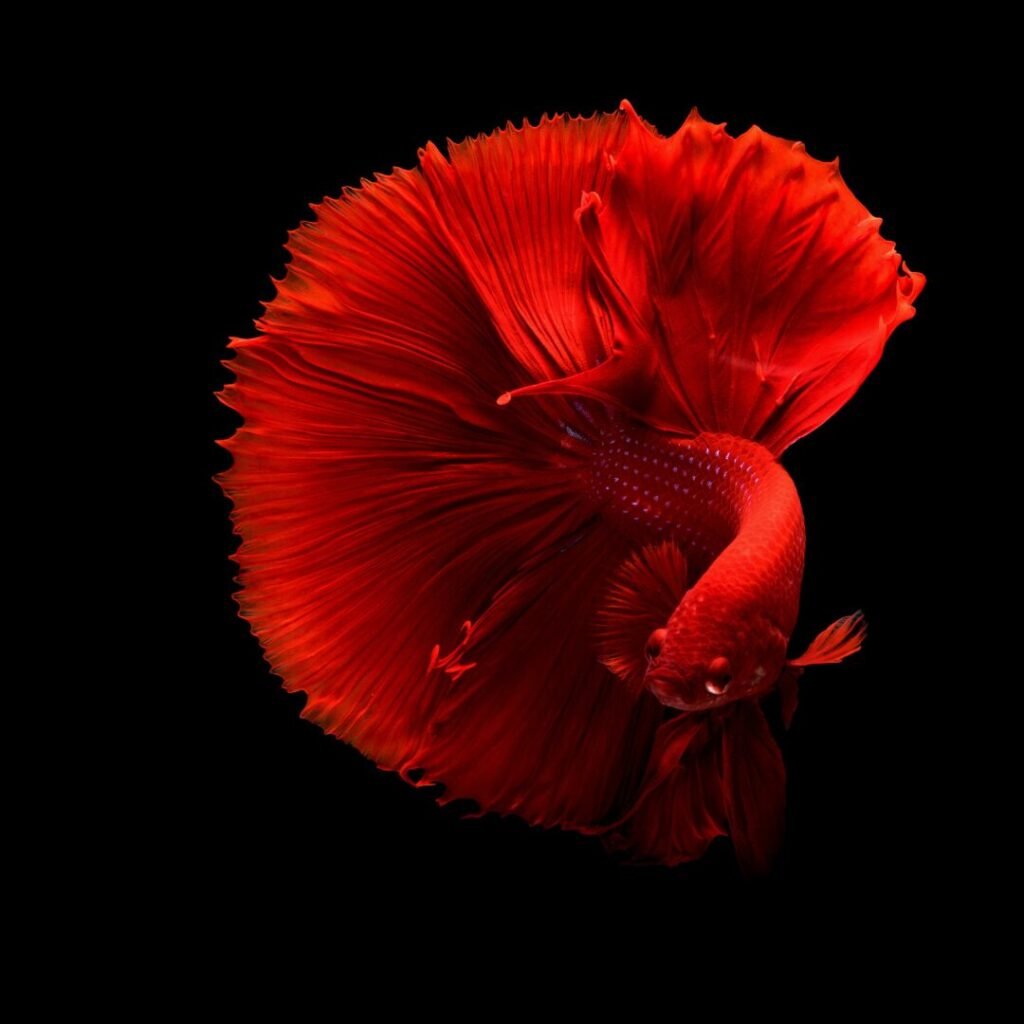Introduction
Betta Fish, also known as Siamese Fighting Fish, possesses vibrant color and flowing fins, which make them a popular choice among fish enthusiasts. If you’ve noticed your Betta fish swimming in circles, you might be concerned about their health. Such behavior may lead to Erratic swimming. In this article, “Betta Fish Swimming In Circles: Understanding The Causes of Erratic Swimming Behavior,” let us guide you in understanding the underlying causes and solutions that are essential for your fish’s well-being.

Understanding Betta Fish Habitat
Betta fish originated from tropical islands, of Southeast Asia, including Thailand, Malaysia, Indonesia, Vietnam, Laos, and Cambodia. In the wild, they survive in warm, slow-moving waters rich in vegetation such as rice paddies, marshes, ponds, swamps, and small streams.
In captivity, mimicking betta fish’s natural habitat is crucial for their overall health and comfort. Bettas thrive in warm water with a consistent temperature between 76°F and 82°F. They also appreciate a well-filtered fish tank or aquarium, preferably with live plants and plenty of hiding sports. Proper water conditions are vital for Betta fish to prevent stress that leads to erratic swimming.
Why Is My Betta Fish Swimming In Circles?
Bettas are tropical fish, and with their vibrant color and flowing fins, watching them thrive and grow can bring us years of pleasure. If you notice that your betta is swimming in circles, then it can be alarming. There are several reasons associated with betta fish swimming in circles, and while not all are cause for concern, yet you must investigate them all.
Abnormal Swimming
When observing your Betta fish, any swimming pattern that deviates from the normal can be classified as abnormal. Abnormal swimming in Betta fish often indicates an underlying problem. Identifying the root cause is essential for effective treatment. Common abnormal behaviors include swimming in circles, darting, or floating uncontrollably.
What Is Erratic Swimming In Betta Fish?
Erratic swimming refers to any unusual swimming motion that seems out of character for the Betta fish. This behavior can manifest in several ways, including spinning around in circles, swimming uncontrollably throughout the tank, or floating aimlessly.
Such behavior is usually a sign of stress, discomfort, or illness. Identifying erratic swimming behavior early can be key to ensuring the health of your fish.
Causes of Erratic Swimming
Understanding the possible causes of Betta Fish Swimming In Circles or Erratic Swimming In Betta Fish will allow you to take action promptly. Here are some common reasons:
Stress
Stress is one of the most common causes of erratic swimming in Betta fish. Stress can arise from poor water conditions, aggressive tank mates, or even sudden environmental changes.
Treatment:
- Try to provide a stress-free environment by mimicking their natural habitat.
- Provide plenty of plants, space, and hiding spots in your betta fish tank.
- Maintain ideal water parameters, such as a water temperature between 76–81°F (25–27°C) and a pH level between 6.5 and 7.5.
- Saperate aggressive tank mates to another tank.
Illness
Betta fish swimming in circles might be a sign that they are sick, as this behavior is generally a sign of illness. Common reasons for fish swimming in circles are illness, injury, and pain.
Treatment:
- Separate your ill betta fish from other fishes to a different tank.
- Try to identify the illness or injury and treat it accordingly.
- consult a veterinary doctor or betta fish expert for the right solution.
- Avoid placing sharp or hurtful objects in your betta fish tank.
Parasitic Infection: Whirling Fish Disease
Whirling disease is a parasite infection caused by Myxobolus cerebralis. These parasites get inside betta fish through infected live food and attack their skeletal system and cartilage, causing erratic swimming.
Treatment:
- Isolate the infected betta fish to a separate fish tank.
- Treating with appropriate anti-parasitic medications is essential.
- Use frozen foods such as bloodworms, daphnia, krill, brine shrimp, etc, instead of live foods.
- Avoid buying fish from breeders that raise their fish in ponds or feed tubifex worms as a cheap protein source.
Ammonia Poisoning
High ammonia levels are toxic to Betta fish and can cause erratic swimming, gasping for air, or even lethargy. Ammonia poisoning is often a result of poor water conditions.
Treatment:
- Regularly test your fish tank water and conduct partial water changes to manage ammonia levels
- Ensure that ammonia levels remain at 0 ppm.
- Use a fish tank filter to keep the betta fish tank clean and improve the water conditions.
- Consider using ammonia-neutralizing products to prevent future issues.
Bacterial Infection In The Brain
Betta fish can suffer from bacterial infections in their brains, leading to disorientation and swimming in circles. Symptoms may also include loss of balance, lethargy, and abnormal posturing.
Treatment:
- Treatment for a bacterial infection involves using antibacterial medications designed for fish.
- Isolate the infected betta fish to a separate fish tank.
- Keep the fish tank neat and clean, and consider adding some aquarium salt.
Nervous System or Neurological Disorders
Various issues, including genetic factors, improper water conditions, injury, or infection can cause neurological disorders in betta fish. Neurological disorders can cause Betta fish to exhibit unusual swimming patterns, such as swimming in circles or upside down.
Treatment:
- If you suspect a neurological disorder, consult a veterinarian specializing in fish for accurate diagnosis and treatment.
- Provide a stress-free environment to help manage the condition.
- Mimic betta fish natural habitat by using plenty of plants and hiding spots.
- Ensure the water quality is excellent and avoid any sudden changes in the tank setup that may increase the severity of symptoms.
Respiratory Problems or Disease
Respiratory issues can lead to oxygen deprivation, causing Betta fish to swim erratically as they struggle to breathe. Poor water quality, lack of oxygen, or diseases like gill flukes can cause respiratory distress.
Treatment:
- Use good spacious fish tanks as per your betta fish needs.
- Do not overcrowd the betta fish tank.
- Ensure the tank is well-aerated and that the water quality is maintained at optimal levels.
- Use a filter or add an air stone to improve aeration
Swim Bladder Disease
Swim Bladder Disease is a common condition in Betta fish that affects their buoyancy, leading to difficulties in swimming. Betta fish affected with swim bladder disease may show symptoms such as swimming sideways, upside down, or in circles.
Treatment:
- Treatment for Swim Bladder Disease often involves adjusting the Betta fish diet, such as fasting for a few days and then feeding cooked, deshelled peas.
- Isolate the betta fish from other tank mates
- Maintain clean water conditions and avoid overfeeding.
Blindness or Poor Vision
If your Betta fish is suffering from blindness or cannot see well, then they may swim in circles due to disorientation as they attempt to navigate their environment. This may be due to illness or injury.
Treatment:
- While betta fish cannot be cured of blindness, you can help them by making them slowly adapt to their environment.
- Keep the tank layout consistent and avoid sudden changes.
- Monitor their eating habits to confirm their vision isn’t impaired.
- Ensure the tank is free of sharp objects to prevent injury.
Poor Water Condition
Poor water conditions, such as high levels of toxins, incorrect pH levels, or extreme temperatures, can stress Betta fish and cause them to swim erratically. Keeping a clean tank is non-negotiable.
Treatment:
- It is crucial to regularly test and change the water to keep the water parameters stable and your Betta fish healthy.
- Adjust the pH and temperature of the fish tank to meet your Betta fish needs.
- Use a filter and heater for better water maintenance.
Poor Diet
A poor diet lacking in essential nutrients can affect a Betta fish’s health, leading to erratic swimming. Feeding your Betta fish an imbalanced, low-quality diet, wrong types of food or overfeeding can also cause digestive issues that impact swimming behavior.
Treatment:
- Ensure giving them a balanced diet with high quality Betta pellets, live or frozen foods like brine shrimp and bloodworms, and occasional plant matter.
- Monitor their every behavior carefully and bring change in their diet as per need and expert advice.
- Avoid overfeeding, as this can lead to Swim Bladder Disease.
Ever wonder How Long Can A Betta Fish Go Without Food?
Aggression and Territorial Nature
Bettas are known for their aggression and territorial nature, especially Male Betta’s. In small tanks or with inappropriate tank mates, if they see their reflection or encounter others encroaching on their territory, they may swim erratically as a sign of aggression or territorial holding. Providing ample hiding spots can reduce aggression.
Treatment:
- To reduce aggression, ensure your Betta fish has enough space for free movement.
- Mimic their natural habitat by adding plenty of plants and hiding spots.
- Avoid keeping aggressive tank mates especially multiple male Bettas in the same tank.
- Keep your betta fish tank neat and clean.
Is Swim Bladder Disease Fatal?
Swim Bladder Disease is not typically fatal, but it can be serious and significantly impact a Betta’s quality of life if left untreated. With proper care and treatment, most Betta fish recover fully from this condition. Prompt and appropriate treatment is the key to preventing long-term complications.
What Are Betta Fish Zoomies?
Betta fish zoomies are sudden bursts of energy where a Betta swims rapidly back and forth in the tank. This behavior is usually harmless and can be a sign that your Betta is happy and healthy. Zoomies are not a form of erratic swimming, however frequent zoomies coupled with other signs of distress may indicate an underlying issue.
Tips For Proper Betta Fish Care
To ensure your Betta remains healthy and active, consider these care tips:
- Keep The Tank Clean: Regularly change the water and keep the tank clean to prevent the buildup of toxins.
- Make A Stress-free Environment: Mimic betta fish natural habitat by adding plenty of plants, hiding spots and other decorations to give them a comfortable and stress-free environment.
- Monitor Water Parameters: Keep an eye on the temperature, pH, ammonia nitrites, and nitrates levels to ensure they are within the recommended ranges. You can also use water testing kits.
- Provide Good Diet: Feed high-quality Betta food supplemented with occasional live or frozen treats.
- Avoid Overcrowding: Ensure your Betta has enough space and avoid keeping multiple males in the same tank. Give your Betta plenty of space to swim and hide.
- Regularly Check For Signs Of Illness: Montor your betta fish behaviou and signs of any illness. Early detection can lead to more effective treatments.

Conclusion
Erratic swimming in Betta fish can be caused by a variety of factors, from stress and poor water conditions to more serious health issues. We hope “Betta Fish Swimming In Circles: Understanding The Causes of Erratic Swimming Behavior.” By understanding the potential causes and knowing how to treat them, you can help ensure your Betta proper care and prevent these issues from arising in the first place. Remember: “A Healthy Betta Is A Happy Betta.”
Frequently Asked Questions
Q: What causes Betta fish to swim in circles?
ANSWER: Erratic swimming can be caused by stress, illness, or poor water conditions.
Q: How can I treat swim bladder disease in my Betta?
ANSWER: Treatment involves adjusting the diet and providing more suitable water conditions.
Q: Are Betta fish susceptible to infections?
ANSWER: Yes, Betta fish can be prone to various infections, including bacterial and parasitic diseases.
Q: How can I improve my Betta’s habitat?
ANSWER: Maintain stable water conditions and provide plenty of hiding spots to reduce stress.
Q: Can poor diet affect my Betta’s swimming behavior?
ANSWER: Absolutely! A poor diet can lead to health issues that may cause erratic swimming patterns.
Q: Why is my Betta fish swimming in circles?
ANSWER: Swimming in circles can indicate stress, poor water conditions, or illness. It’s important to monitor your Betta and address any potential issues promptly.
Q: How can I prevent Swim Bladder Disease in my Betta fish?
ANSWER: Prevent Swim Bladder Disease by feeding your Betta a balanced diet, avoiding overfeeding, and maintaining clean water conditions.
Q: Can Betta fish recover from neurological disorders?
ANSWER: While there is no cure for neurological disorders in Betta fish, providing a stress-free environment and maintaining excellent water quality can help manage the condition.
Q: What should I do if my Betta fish is showing signs of a parasitic infection?
ANSWER: Quarantine the affected fish and treat it with the appropriate medication designed for parasitic infections. Regular tank maintenance is also crucial to prevent the spread of the parasite.
Q: Are Betta fish aggressive towards other fish?
ANSWER: Yes, Betta fish, particularly males, are known for their aggression and territorial behavior. It’s best to keep them in separate tanks or carefully select compatible tank mates.
You May Also Checkout:

